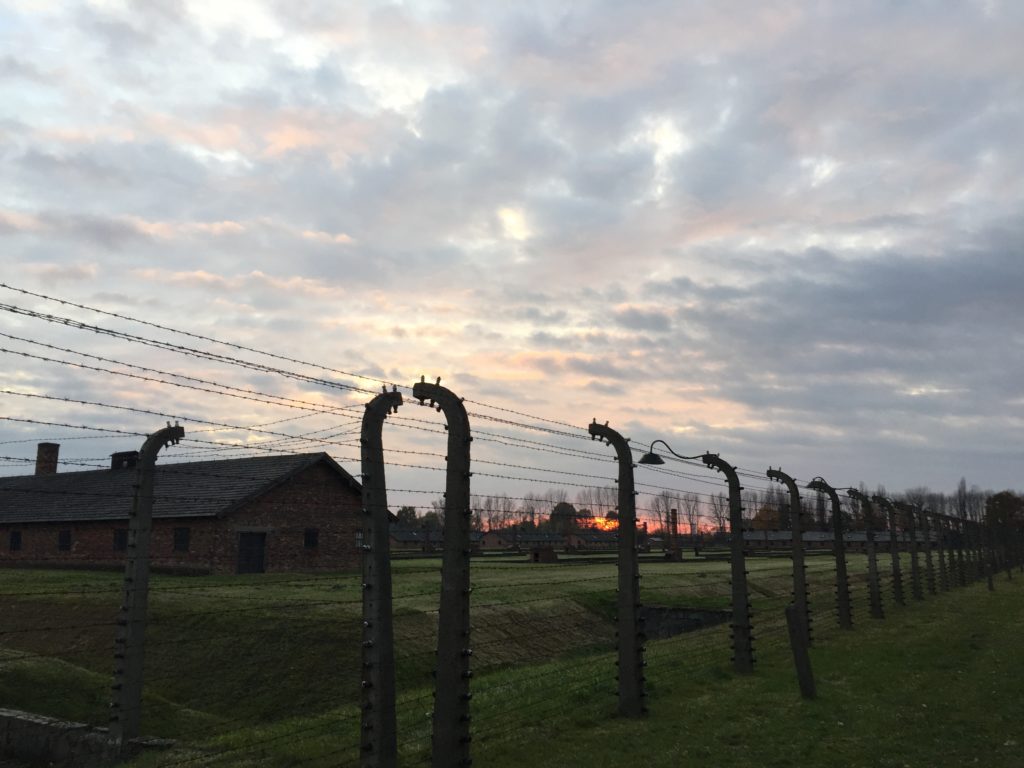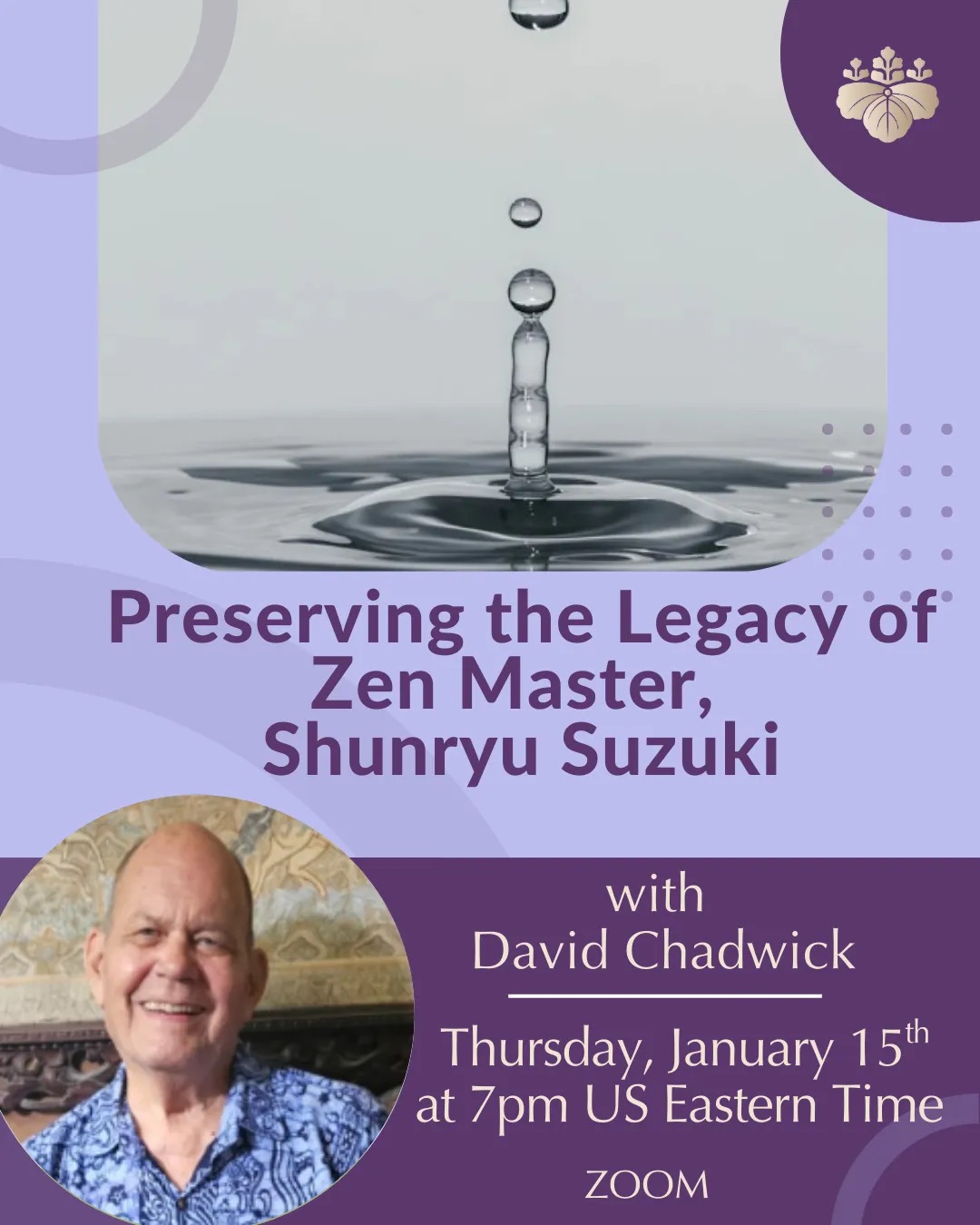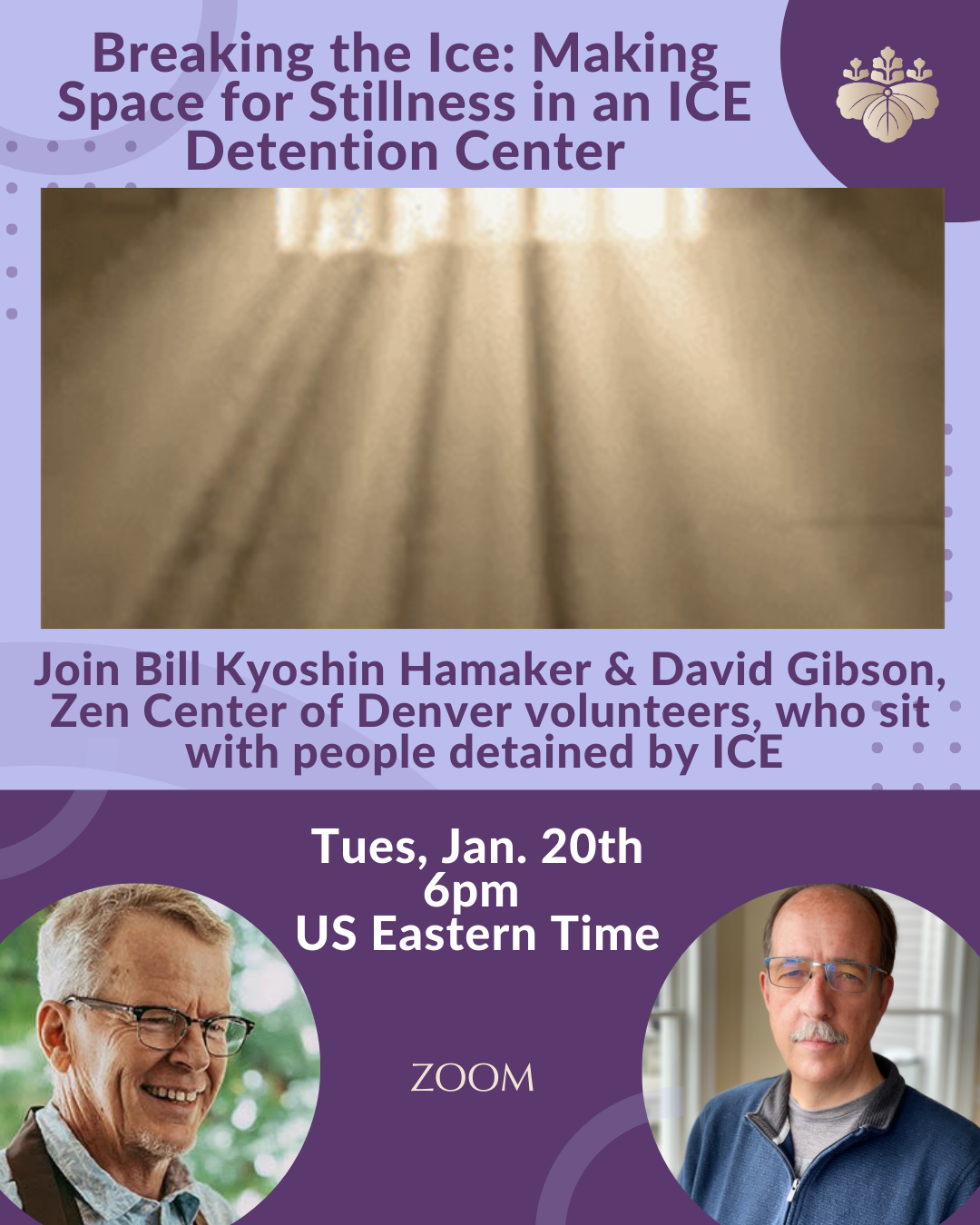In June 2011 Bernie Glassman brought another group to Auschwitz to Bear Witness. A hundred and fifty of us traveled from all over the world to attend. Ten years before I had heard about these Auschwitz retreats. I was drawn, but too scared. It was too immense, too far away. How would I even get to Poland?
But I have always loved being a Jew and was haunted by the Holocaust. When I taught in the public schools I read Night by Elie Wiesel aloud to my students and we had Holocaust projects. A mother came to me one morning before class, “Don’t you think it’s too hard for sixth graders? My daughter had nightmares all last night after doing research for her paper.”
“No,” I said. “If we look evil in the face, we will know it and not run from it.”
She nodded as she backed out the door.
Almost a year before the 2010 retreat Beate Stolte, the co-abbot at Upaya Zen Center, called to tell me she was going. Without a thought I jumped in, “I’m coming too.”
Germany terrified me. My family shunned anything German. Before Beate I rarely even spoke to a German. But at a retreat Joan Halifax and I did on the new Prajna land, Beate ended up being my partner on a silent nine-mile hike to the San Lorenzo Lakes. Prajna is at nine thousand feet and we were going to ascend to eleven thousand. In other words, the hike was steep and I was out of shape.
Every once in a while I whispered to Beate, “How much further?” By now most students were way ahead.
She’d whisper back assuringly in her deep German accent, “Oh, just a little further.”
About noon with the sun far overhead, the day heated, perspiration running down my face, hungry for the lunch in my backpack, when I asked her again, and she answered with the same encouragement, “Just up a bit”, I threw down my pack and yelled in her face, “I don’t believe you and I hate Germans.”
This was our true meeting. Instead of becoming defensive, she gently said, “I know what you mean. Sometimes I hate them too. I am so ashamed of what we have done.”
We both sat down in the tall weeds under the shade of the aspens, eating cheese sandwiches, and sharing the Jewish and German sides of our suffering.
A great weight lifted from me. Germans were human. I’d been practicing Zen for thirty years but still carried deep prejudice that I thought I had a historical right to. Yes, at times in long meditation retreats that part of me crumbled but I quickly reassembled it to face the world and protect myself.
So after this encounter I naturally leaped at the opportunity to go to Auschwitz as Jew and German. From the very beginning it felt healing, democratic, a fresh bond.
Six months before the trip great terror haunted me in the night. Unnamed, unconscious fears.
When I taught in Houston I went to the Holocaust Museum there. As I walked along the aisles of the exhibit I was concentrated, analytic. Good information, I thought, for my trip. And when it was done, I burst out the front door, literally ran to a chocolate shop and ate three ice creams right in a row. There was no way I could wrap my head around the material. And yet, I had taught it. I had always kept it at a distance.
Three months before the June retreat I was giving a keynote at a conference in Washington, D.C. I spent six hours at the grand Holocaust museum there. I went alone. Again I was concentrated, took in every detail in the way I can as a writer, even-minded. The moment I left, the experience left me. I did not think of it once during the conference.
Home, six days later, I woke up trembling, full of anxiety. Finally by three in the afternoon I surrendered, not trying just to get through my day, I turned on the computer and turned to the pain. My hands ran across the keys, my eyes closed, I shook and sobbed. My adored grandfather escaped the pogrom in Russia by coming to American in the early Twentieth Century but they hadn’t stopped looking for us. I was sure now they knew where I was and were coming to my door in Santa Fe any minute. They were climbing over the fence, no place to escape, as I wrote I kept glancing out the window. Any minute now–my whole body felt this, I would be taken away. I completely believed it as fact.
My family never spoke about pogroms. I was born in 1948 when the horror of the German concentration camps was just coming out. None of it was ever mentioned in my family but like serum, the panic was injected straight into my veins, unconscious, undigested. Going to the museum in Washington made it come alive.
When I finally physically arrived at Auschwitz, I realized I knew this place. I’d carried it in me all my life and though no known relatives had died there, all the murdered beings we could feel in the tall late spring grass were my people. And I, too, had died there. I was not separate. I kept repeating to myself, this is the darkest of the dark. Unexplainable, inconceivable and yet it happened.
The bookstore at Auschwitz was full of memoirs, accounts of survivors, histories of World War II, what happened to Jews in Poland, Czechoslovakia, Hungary, Denmark, Slovenia. Beate and I brought back to our shared room piles of books. Long into the evenings, late into the nights as the crickets screamed outside and after hot days meditating on the tracks where the trains pulled in and the selections happened, both of us lay in our single cots, side by side, reading, like two hungry animals turning slowly on a spit and roasting. We wanted to know, to understand, to make sense–but there was no sense.
I bought videos of what was seen when the camps were freed by the Russians. And when I came home I greeted friends at the door, “Would you like to see a film on Auschwitz?”
At the time I returned the oil leaks in the Gulf were on all the news channels. That’s nothing, I thought. Let me show you what happened in Poland. I was stuck in a time warp. The Holocaust was vividly alive for me. Why go on? Why continue, if human beings were capable of doing this?
For five years my friend Eddie and I had had an African book club and I thought reading about King Leopold, Rwanda, what the British did to the Mau Maus, had readied me. But the Germans had taken genocide to an industrial level. They used every part of the Jews. Even their ashes were shipped to Germany to fertilize their fields.
And something else. I was a Jew. I could be outraged at the atrocities in Africa as a decent human being but this was different. I had no distance. I collapsed into darkness. Why didn’t you like us? What was wrong with us? Every layer of my heart hurt. I didn’t have the strength to feel outrage.
I came home and lived in the world of the camps. My friend John Dear, a Jesuit nonviolent activist, said to me, “Natalie, you have to stop reading this stuff. There’s a limit.”
I did finally let go of the reading. Over months I came back to present life, to Obama in the White House, to the students before me with their bent heads over notebooks. Beate and I gave talks about our experience. I told people that we need to also understand the guilt and shame of the Germans and the suffering of war.
And then one day as I was embroiled in thoughts, some daily controversy, I heard someone across the room mention Auschwitz. The word went through me and love spontaneously flooded my whole body, legs, chest, knees, arms, whole face lit up. Auschwitz had become synonymous with love. Dare I say that? I no longer carried all the cremated Jews unconsciously around with me. I acknowledged them and gained strength from them. The Germans weren’t my enemy. I was free. No horror couldn’t be faced.
Bernie e-mailed me soon after the retreat, asking me if I’d written anything about it. I digest things slowly. Only yesterday, hearing a lecture at Upaya Zen Center, where Wendy Johnson read from Bearing Witness, did I pick up his book. Everything about going to Auschwitz in his book is true. The words are not separate from the experience. It all bleeds together. I thank him for having such a large vision of what Zen can be.



